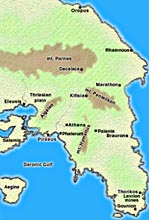In ancient societies, the economy was largely based
on the land. In Attica, too, although what is usually
emphasized is the part played by trade and workshops, it was
farming that was of primary importance.
At the start of the Peloponnesian War, so Thucydides
tells us, the majority of Athenian citizens lived outside
Athens. Nor (he says) did this situation alter before the
very end of the war (Thucydides, Histories
2.16.1). In 403, two thirds of all Athenians were still
owners of land. It should however be emphasized
that from an economic point of view they did not depend
entirely on tilling this land. There were a fair number
of well-off landowners investing, at this time, in maritime loans,
real estate, workshops staffed by slaves, or silver mines at
Laurion. |
 |




